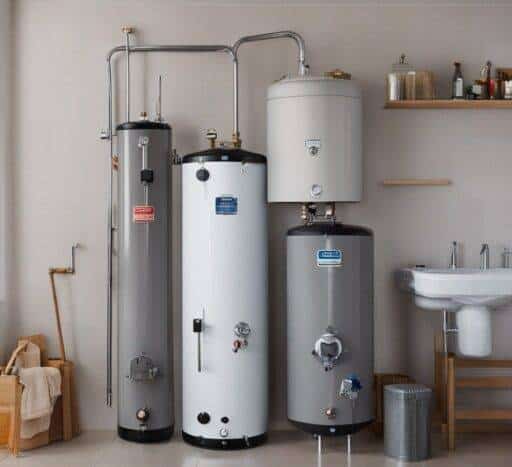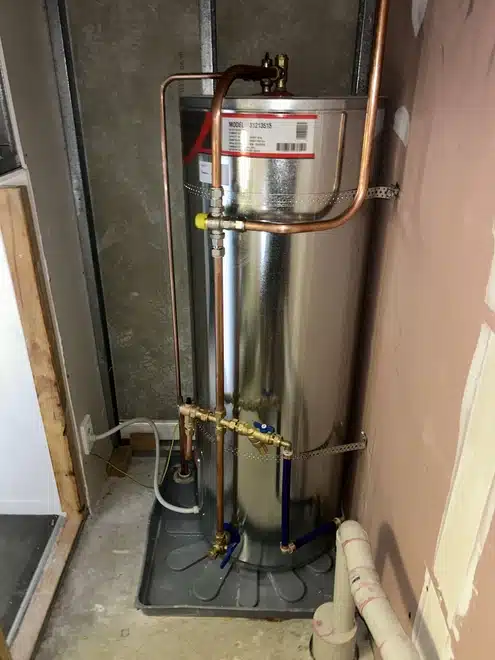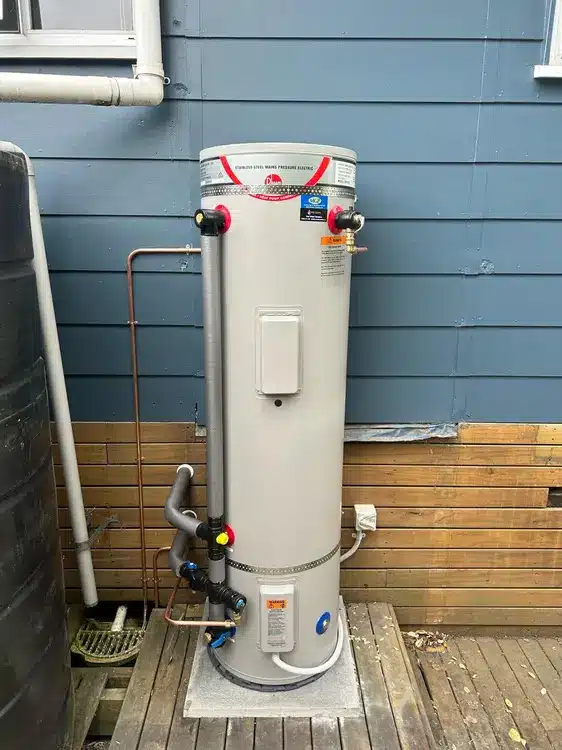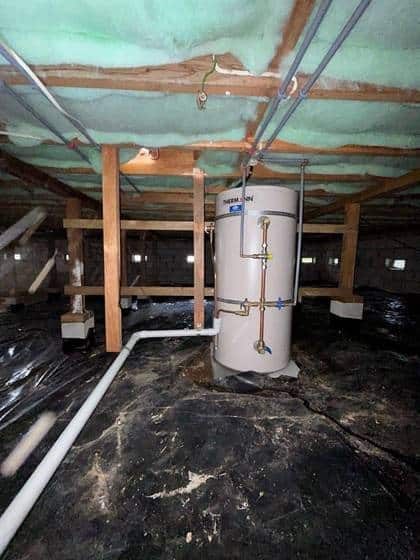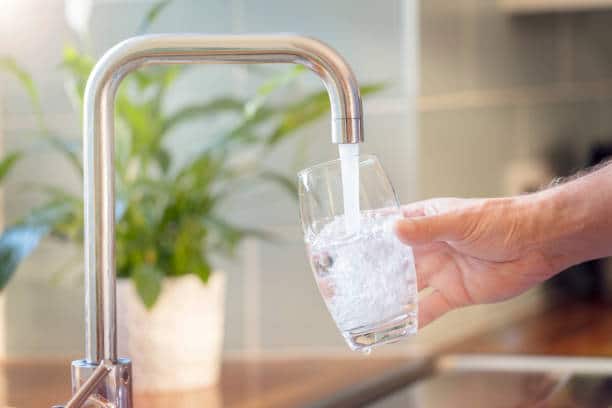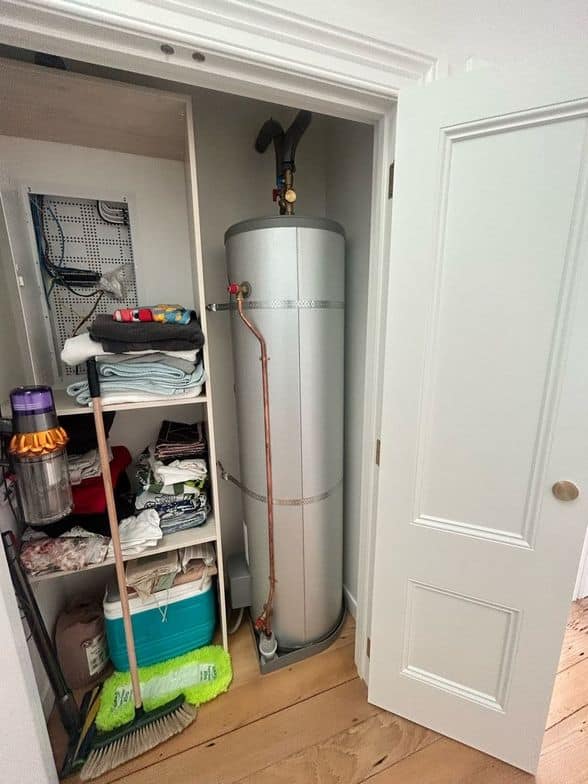1. Thorough Check of Inlet and Outlet Pipes
The inspection of inlet and outlet pipes should be one of the first items on your commercial water heater maintenance checklist. These pipes handle the continuous flow of water to and from your system and are prone to scaling, corrosion, and even leaks.
What to Look For:
- Signs of corrosion or rust, especially near joints
- Leaks or drips, even minor ones
- Blockages due to limescale or sediment
Regularly inspecting these pipes helps ensure consistent water flow and reduces the risk of pressure buildup. For businesses in colder regions like Dunedin or Invercargill, it’s also essential to check for potential freezing or cracking in exposed pipe sections.
2. Regular Testing of the T&P Valve
The temperature and pressure relief (T&P) valve is a critical safety component. It prevents dangerous pressure buildup by releasing water if the system overheats or becomes over-pressurized.
How to Test It:
- Lift the valve’s test lever slightly until you hear water discharge.
- Allow it to drain for a few seconds.
- Release the lever and ensure the valve reseals properly.
A faulty T&P valve could lead to explosions or tank ruptures, which are catastrophic in commercial settings like schools or healthcare facilities. Testing should be done every six months or more frequently in high-use environments.
3. Scheduled Draining and Flushing of the Cylinder
Draining and flushing the cylinder is a fundamental maintenance step that removes sediment buildup. In commercial systems, this should be done quarterly due to the high water volume and usage frequency.
Benefits of Flushing:
- Improves energy efficiency
- Extends the life of the heating elements and tank
- Reduces noise from the unit
Neglecting this step is one of the most common causes of early water heater failure. In high-mineral areas such as Canterbury or Hawke’s Bay, flushing is even more essential due to faster sediment accumulation.
4. Detailed Inspection of the Heating Element
If your commercial system uses electric heating, a routine inspection of the heating element is crucial. Elements that are coated in limescale or have burnt out can drastically reduce heating efficiency.
Key Indicators of a Faulty Element:
- Inconsistent water temperature
- Increased energy bills
- Slow hot water recovery time
Use a multimeter to test the element for continuity. If the resistance is off or the element is heavily coated in scale, it’s time for a replacement. In commercial kitchens and manufacturing facilities, this step can’t be overlooked.
5. Review and Assessment of Insulation Quality
The assessment of insulation plays a significant role in improving energy retention. A well-insulated system reduces heat loss, conserves energy, and minimizes reheating cycles.
Areas to Check:
- Insulation wrap around the tank
- Pipe insulation, especially in cold zones
- Seals and gaskets for heat leaks
Older systems often lack sufficient insulation. Upgrading this can reduce energy costs significantly, an attractive proposition for businesses in energy-conscious cities like Nelson or Tauranga.
6. Comprehensive Inspection of Venting Systems
Gas-powered commercial water heaters rely on effective venting systems to safely expel exhaust gases like carbon monoxide. The inspection of venting systems ensures your system is not only efficient but also safe.
Inspection Checklist:
- Examine flue pipes for rust, blockages, or disconnects
- Ensure vent terminations are clear of debris
- Confirm that airflow is not obstructed by external elements
Improper venting can lead to hazardous air quality issues, fines, or even building shutdowns. This step is vital for businesses in compliance-heavy sectors such as food production or healthcare throughout New Zealand.
Additional Tips for Long-Term Efficiency and Safety
While the main checklist is vital, here are some additional suggestions to keep your system in top condition:
- Set an Optimal Thermostat Temperature
Maintain water temperatures between 60°C and 65°C—hot enough to prevent bacterial growth (like Legionella) but not so hot as to waste energy or cause scalding.
- Install Expansion Tanks
In closed-loop systems, an expansion tank helps manage increased pressure from thermal expansion. This is particularly important in multi-storey buildings like office towers in Auckland or high-rise apartments in Wellington.
- Monitor Energy Usage
Unusual spikes in energy use often indicate system inefficiencies. Use smart meters or energy management systems to track and optimise performance.
- Log Maintenance Activity
Keep a detailed record of all inspections, repairs, and replacements. This documentation is helpful for compliance and troubleshooting, and may also be required for insurance or health and safety audits.
Why Preventive Maintenance Saves You Money
It’s easy to forget about your water heating system until it fails, but in a commercial setting, breakdowns can be incredibly disruptive and expensive. Regular maintenance helps you:
- Avoid emergency repairs
- Extend the lifespan of your system
- Improve energy efficiency
- Stay compliant with health and safety regulations
The cost of routine checks is minimal compared to the expense of system downtime or full equipment replacement. For businesses operating year-round, like hotels, aged care facilities, or manufacturing plants, preventive maintenance is not optional; it’s essential.
Professional Help for Commercial Water Heater Maintenance in NZ
While some maintenance tasks can be handled in-house, others require a qualified technician. If your commercial water heater is aging, underperforming, or hasn’t been professionally serviced in the last 12 months, it’s time to take action.
Working with specialists in Hot Water Cylinders New Zealand ensures you receive tailored advice, safety checks, and compliant installations. Companies like Hot Water Solutions NZ offer nationwide service and expertise, with commercial-grade systems built for performance and longevity.
Tailored Maintenance for Different Commercial Sectors
Water heater maintenance needs can vary depending on your industry. Here’s a quick overview:
- Hospitality
Hotels, restaurants, and cafés need high-capacity systems with consistent temperature delivery. Maintenance should focus on scale control and redundancy systems.
- Healthcare
Hospitals, clinics, and care homes require strict temperature control to avoid bacteria like Legionella. Regular T&P testing and documentation are essential.
- Industrial
Factories and workshops with high-volume use need durable systems with enhanced venting and drainage capacity. Safety inspections and energy audits are vital.
- Residential Buildings
Apartment blocks often have shared systems. Maintenance should ensure even distribution, prevent pressure issues, and include regular tenant feedback reviews.
Whether your facility is in Auckland, Rotorua, Wellington, or anywhere in between, commercial maintenance should reflect the environment, building type, and usage level.
Final Thoughts
Maintaining your commercial water heater isn’t just a technical necessity—it’s a strategic investment in efficiency, safety, and reliability. From the inspection of inlet and outlet pipes to the draining and flushing of the tank, every step plays a role in the system’s longevity and performance.
If you’re looking to upgrade or maintain Hot Water Cylinders New Zealand businesses rely on, connect with the trusted experts at Hot Water Solutions NZ. They offer customised services for every commercial sector.
For long-lasting performance and peace of mind, Hot Water Solutions NZ delivers expert commercial water heater solutions throughout New Zealand. Their certified team helps businesses stay safe, compliant, and energy-efficient—nationwide.

